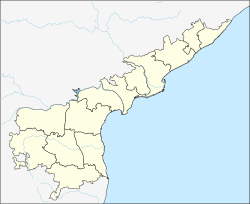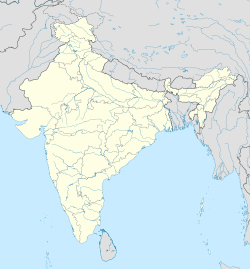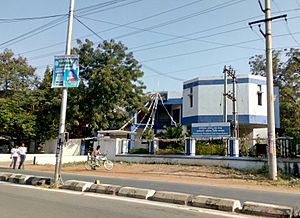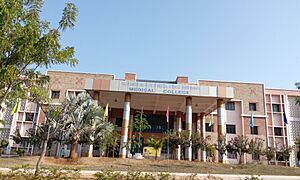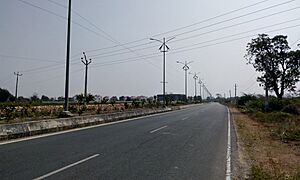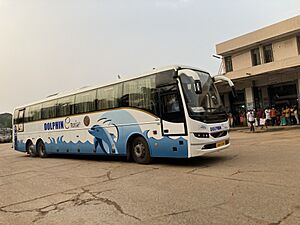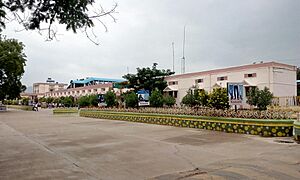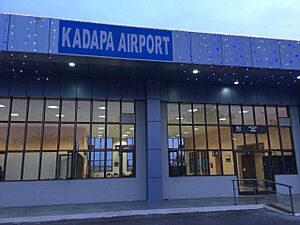Kadapa facts for kids
Quick facts for kids
Kadapa
Cuddapah
|
|
|---|---|
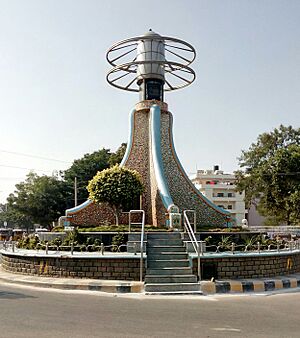
Pylon commemorative of 200 years
|
|
| Country | |
| State | Andhra Pradesh |
| Region | Rayalaseema |
| District | YSR District |
| Incorporated (town) | 1868 |
| Incorporated (city) | 2004 |
| Government | |
| • Type | Municipal corporation |
| • Body | Kadapa Municipal Corporation Annamayya Urban Development Authority (AUDA) |
| Area | |
| • City corporation | 164.08 km2 (63.35 sq mi) |
| Elevation | 138 m (453 ft) |
| Population
(2022)
|
|
| • City corporation | 466,000 |
| • Rank | 126th (India) 8th (Andhra Pradesh) |
| • Density | 2,840.1/km2 (7,356/sq mi) |
| Demonym(s) | Kadapa bidda |
| Languages | |
| • Official | Telugu Urdu |
| Time zone | UTC+5:30 (IST) |
| PIN |
516001,002,003,004,005,126
|
| Telephone code | 08562 |
| Vehicle registration | AP-39 (now), AP-04 (previous) |
Kadapa is a city in the southern part of Andhra Pradesh, India. It is the main city of the YSR Kadapa district. In 2022, about 466,000 people lived there.
The city is located near the Penna River. It is surrounded by the Nallamala and Palkonda Hills. These hills are between the Eastern and Western Ghats. Kadapa is sometimes called "Gadapa," which means 'threshold' or 'gateway.' This is because it was once the main way to reach the hills of Tirumala from the west.
Kadapa has a long history. Many different rulers have governed the city. These include the Cholas, the Vijayanagara Empire, and the Kingdom of Mysore.
Contents
What Does the Name Kadapa Mean?
The name "Kadapa" comes from the Telugu language word "Gadapa." This word means "threshold" or "gate." People used to pass through this city to reach the famous Venkateswara Temple in Tirumala. So, it was like a gateway.
The city was once spelled "Cuddapah." But on August 19, 2005, its spelling was changed to "Kadapa." This change was made to match how local people pronounce the name.
A Look at Kadapa's History
Kadapa has a very old history, going back to the second century BC.
Early Rulers of Kadapa
Archaeological findings show that the Maurya Empire and Satavahana dynasty were among the first to rule here. After them, many other groups took control. These included the Chalukya, Cholas, and Pallava dynasties.
The Pallava dynasty was the first to rule Kadapa in the fifth century. Then, the Cholas took over until the eighth century. Later, the Banas also ruled the area.
Kadapa Through the Centuries
After the Banas, the Rashtrakuta dynasty ruled Kadapa. King Indra III was a powerful ruler around 915 AD. Under him, Kadapa became very strong. But its power decreased after his death.
Next, the Telugu Cholas ruled Kadapa. In the late 1200s, Ambadeva made Vallur his capital. Vallur is about 15 km from Kadapa.
After Ambadeva, the Kakatiya dynasty king Prataparudra II ruled until the early 1300s. He was defeated by Muslim rulers. Later, in the mid-1300s, the Vijayanagara Empire drove out the Muslims. They ruled Kadapa for about 200 years. Pemmasani Thimma Nayudu (around 1422 CE) was a famous ruler from this time. He helped develop the region and built many tanks and temples.
In 1594, the Muslims of Golkonda conquered the region. Mir Jumla II took over the Gandikota fort. Later, the Marathas took control of Kadapa in 1740.
Hyder Ali and Tipu Sultan also ruled Kadapa from 1784 to 1792. After them, the Nizam gained control in 1792. Finally, the British Raj took over Kadapa District in 1800 CE.
Kadapa was recognized as a municipal corporation in 2004. This means it became a bigger, more organized city.
Kadapa's Location and Environment
Kadapa is in the Rayalaseema region of Andhra Pradesh. It is about 260 km from Chennai and 250 km from Bangalore. The city is located near the Bugga Vanka and Ralla Vanka rivers. The Palakondas hills are to the south, and other hills are to the east. The city is about 138 meters (452 feet) above sea level.
Kadapa's Climate
Kadapa has a hot, semi-dry climate. This means it is hot for most of the year. Temperatures can reach up to 45 degrees Celsius (113 degrees Fahrenheit). Summers are very hot and humid. During this time, temperatures are usually between 25°C (77°F) and 45°C (113°F).
The monsoon season brings a lot of rain. Kadapa gets rain from both the southwest and northeast monsoons. About 615 mm (24 inches) of rain falls between June and October. The total yearly rainfall is about 770 mm (30 inches).
Winters are much milder. Temperatures are lower, usually between 17°C (63°F) and 32°C (90°F). Humidity is also lower in winter, making it a good time to visit.
| Climate data for Kadapa (1981–2010, extremes 1901–2007) | |||||||||||||
|---|---|---|---|---|---|---|---|---|---|---|---|---|---|
| Month | Jan | Feb | Mar | Apr | May | Jun | Jul | Aug | Sep | Oct | Nov | Dec | Year |
| Record high °C (°F) | 37.8 (100.0) |
41.5 (106.7) |
43.5 (110.3) |
45.3 (113.5) |
46.1 (115.0) |
45.7 (114.3) |
40.6 (105.1) |
40.0 (104.0) |
39.8 (103.6) |
39.5 (103.1) |
36.5 (97.7) |
35.6 (96.1) |
46.1 (115.0) |
| Mean daily maximum °C (°F) | 32.1 (89.8) |
35.3 (95.5) |
38.8 (101.8) |
40.8 (105.4) |
40.5 (104.9) |
37.1 (98.8) |
34.8 (94.6) |
33.7 (92.7) |
33.8 (92.8) |
32.7 (90.9) |
31.2 (88.2) |
30.6 (87.1) |
35.1 (95.2) |
| Mean daily minimum °C (°F) | 18.9 (66.0) |
20.9 (69.6) |
24.2 (75.6) |
27.1 (80.8) |
27.8 (82.0) |
26.7 (80.1) |
25.6 (78.1) |
25.1 (77.2) |
24.7 (76.5) |
23.8 (74.8) |
21.1 (70.0) |
18.9 (66.0) |
23.7 (74.7) |
| Record low °C (°F) | 10.0 (50.0) |
12.0 (53.6) |
12.6 (54.7) |
17.2 (63.0) |
18.0 (64.4) |
17.6 (63.7) |
16.2 (61.2) |
16.0 (60.8) |
14.6 (58.3) |
16.0 (60.8) |
13.8 (56.8) |
10.6 (51.1) |
10.0 (50.0) |
| Average rainfall mm (inches) | 2.6 (0.10) |
0.8 (0.03) |
6.6 (0.26) |
16.5 (0.65) |
51.6 (2.03) |
76.9 (3.03) |
122.7 (4.83) |
119.0 (4.69) |
156.2 (6.15) |
139.5 (5.49) |
60.0 (2.36) |
18.1 (0.71) |
770.4 (30.33) |
| Average rainy days | 0.2 | 0.1 | 0.5 | 1.0 | 2.3 | 4.2 | 6.9 | 6.9 | 7.6 | 6.6 | 4.2 | 1.3 | 41.7 |
| Average relative humidity (%) (at 17:30 IST) | 50 | 39 | 31 | 30 | 34 | 46 | 52 | 56 | 58 | 63 | 65 | 60 | 49 |
| Source: India Meteorological Department | |||||||||||||
Kadapa is ranked as the 23rd best "National Clean Air City" in India for cities with 3-10 lakh people.
People and Languages in Kadapa
| Historical population | ||
|---|---|---|
| Year | Pop. | ±% |
| 1871 | 16,307 | — |
| 1891 | 18,307 | +12.3% |
| 1901 | 16,432 | −10.2% |
| 1911 | 17,807 | +8.4% |
| 1961 | 49,027 | +175.3% |
| 1971 | 66,195 | +35.0% |
| 1981 | 103,125 | +55.8% |
| 1991 | 121,463 | +17.8% |
| 2001 | 287,093 | +136.4% |
| 2011 | 344,893 | +20.1% |
| Religion in Kadapa (2011) | ||||
|---|---|---|---|---|
| Hinduism | 65.42% | |||
| Islam | 31.65% | |||
| Christianity | 1.81% | |||
| Other or not stated | 1.12% | |||
Kadapa is one of the fastest-growing cities in Andhra Pradesh. In 2011, the city had about 344,078 people. About 172,969 were males and 171,109 were females. The city's literacy rate was 79.34 percent. This means most people can read and write.
Most people in Kadapa are Hindus (65%). About 32% are Muslims, and 2% are Christians.
What Languages Are Spoken in Kadapa?
In 2011, most people in Kadapa spoke Telugu (67.37%) as their first language. A large number of people also spoke Urdu (31.04%).
Kadapa's Culture and Food
Kadapa has a rich culture. It has been shaped by many different rulers and religions. People practice Hinduism, Islam, and Christianity. The city is known for its historic Devuni Kadapa temple and the Ameen Peer Dargah.
Arts and Crafts in Kadapa
Shilparamam is a special crafts village. It is located just outside Kadapa. Here, you can see and buy traditional arts and crafts.
Delicious Food in Kadapa
Kadapa is famous for its spicy and tasty food. It is similar to other South Indian food. For breakfast, people often eat dosa, idly, sambar, and chutney. Lunch usually includes Rice, daal, and curry.
Some unique dishes from Kadapa include Ragi Sangati (also called Ragi Mudda). This is a healthy dish made from finger millet. Other popular dishes are Boti Curry, Natukodi Chicken, and Paya Curry. Ragi sangati with chicken curry is a very popular and common meal in Kadapa. You can find many different kinds of food in local restaurants. Like many cities, Kadapa also has many fast food options.
Kadapa's Economy
In 2020, the economy of Kadapa city was worth about $2.038 billion.
The city's economy mainly relies on agriculture and mining. Farmers grow crops like groundnut, cotton, and different types of grams. Many people also work in government jobs. Others work in shops, hotels, and marketing. Tourism also helps the city's economy. Kadapa is one of the cities that McKinsey & Company chose as a "growth hotspot" in India. This means it is expected to grow a lot.
Education in Kadapa
Kadapa has many schools for primary and secondary education. These schools are run by the government, or they are private schools.
Colleges and Universities in Kadapa
Kadapa is home to several important institutions:
- Rajiv Gandhi Institute of Medical Sciences, Kadapa (a medical college)
- KSRM College of Engineering (an engineering college)
- Yogi Vemana University (a university)
- Fathima institute of Medical Sciences (another medical college)
Getting Around Kadapa
Kadapa City has good connections by road, rail, and air.
Roads in Kadapa
Kadapa is well connected by roads to major cities like Tirupati, Bangalore, and Chennai. The APSRTC (Andhra Pradesh State Road Transport Corporation) provides bus services. These buses go to different places within the Kadapa district and to other cities in South India. The city has a total road length of over 800 km.
Railways in Kadapa
Kadapa has its own railway station. It is one of the oldest in the state, opened around 1866. The busy Mumbai–Chennai line passes through Kadapa railway station. This station is an important "A category" station in the South Coast Railway zone. A new railway line connecting Kadapa to Bangalore is currently being built.
Flying from Kadapa
Kadapa Airport opened on June 7, 2015. It is located about 12 km northwest of the city.
| Airlines | Destinations |
|---|---|
| Indigo | Bangalore, Chennai, Hyderabad, Vijayawada, Visakhapatnam |
Images for kids
-
Ancient Kadapa region was part of the Vijayanagara Empire (1336 - 1646)
See also
 In Spanish: Kadapa para niños
In Spanish: Kadapa para niños
 | Kyle Baker |
 | Joseph Yoakum |
 | Laura Wheeler Waring |
 | Henry Ossawa Tanner |


